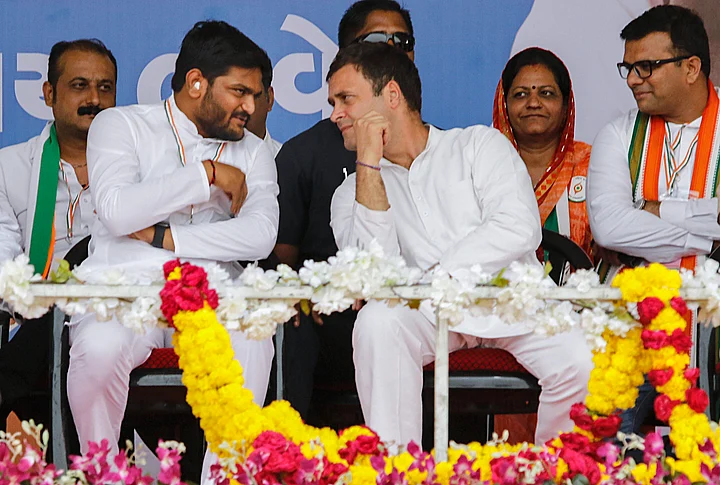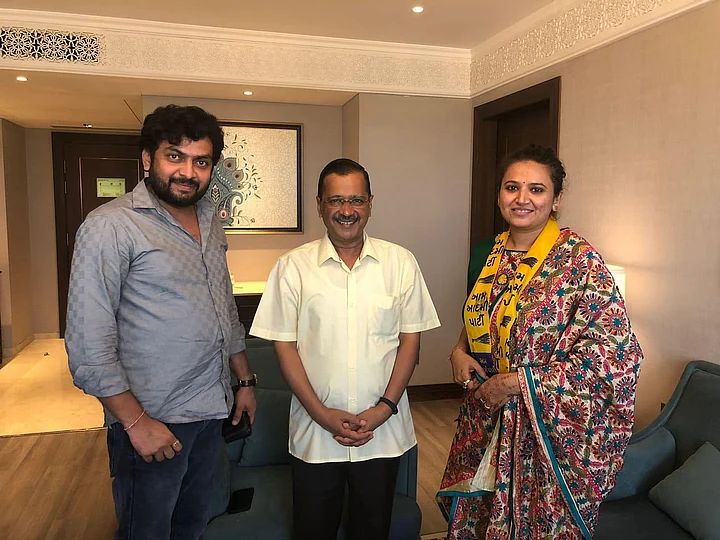Video Editor: Purnendu Pritam
"Gujarat's media comes to us only when there are elections and remembers those who died in the Patidar protests. Otherwise, they don't remember either the victims or their families. So, we have taken a step back from speaking to them," said Brijesh Patel (29), a resident of Palanpur in Gujarat's Banaskantha district.
Brijesh's uncle Kanu Patel was one of the 14 people who died during the Hardik Patel-led protests for reservation for the Patidar community in Gujarat between 2015-2017.
Kanu Patel was killed in alleged firing by policemen at a violent mob in Gadh village near Palanpur, as protests flared across the state on 25 and 26 August 2015.
Protests had flared in the state after Hardik Patel, then 22 years old, was briefly detained by the Gujarat police from the GMDC ground in Ahmedabad where a massive rally was organised. "Till we don't get what we deserve, we won't stop the agitation," Hardik had said while addressing thousands.
An 18-year-old Mahesh Patel was also killed in Gadh during the clashes.
"After Hardik was arrested that day, people had gathered in Gadh, the way they had gathered at several places in Gujarat. My uncle and two others from the Banaskantha region were killed," Brijesh said.
Over the years, Brijesh has taken to protests, dharnas, threatened to self-immolate outside the district collector's office, and has challenged the Gujarat police's claims in court over what unfolded in Gadh village that night. Seven years on, his family is still looking for answers and accountability.
The Death of Kanu Patel
"One of the protesters called us and told us that my uncle has been shot and asked us to come to the civil hospital," Brijesh said
"On 27 August 2015, the post-mortem was conducted, the bullets were sent for forensic analysis, and they handed over the bodies to us. Between 2015-2022, there has been no clarity on who fired the shots. We have approached the authorities and even the chief minister multiple times, but there has been no progress in the case," he said.
"They only gave Rs 4 lakh as compensation. Can anybody run their houses in Rs 4 lakh?" Brijesh asked.
The Gujarat police in its affidavits submitted to the Palanpur court maintained that the firing was not done on purpose and was done in retaliation against the violent mob that had allegedly attacked the station and that there were miscreants in the mob who had fired the shots.
A Suicide That Rattled a Surat Family
Months after the clashes, Bhavin Khunt, a 27-year-old youth associated with the Patidar movement died by suicide in April 2018 in his Surat home. Bhavin was upset allegedly with the police crackdown in the Mehsana region against senior leaders of the agitation who had started a 'jail bharo' protest.
"Don't know what got to him after he returned home. He thought that mere protests would not help, so he died by suicide. He thought if he does something big, they would release all those who have been arrested," said Bharat Katheriya, Bhavin's maternal uncle who lived in the same locality as Bhavin.
"I have seen him since he was a toddler. He got married here and his last rites were also conducted here. I am devastated since he is gone," he added.
While the exact reasons behind Bhavin's suicide remain unclear, with several claims of a strained marriage and financial difficulties being cited by the police back then, leaders of the movement declared Bhavin a martyr who died for the movement.
7 Years On, Families Reflect Upon Patidar Politics
In 2019, the Centre amended the Constitution to extend 10% reservation to Economically Weaker Sections (EWS), which the Gujarat government immediately implemented in order to placate the protesting Patidars.
Meanwhile, most leaders of the movement joined political parties. While Hardik Patel recently quit the Congress to join the Bharatiya Janata Party (BJP), Dharmik Malaviya and Alpesh Katheriya, the two biggest faces of the movement in the Surat belt, recently joined the Aam Aadmi Party (AAP). Reshma Patel, too, joined the AAP recently after her stints with the BJP and the Nationalist Congress Party (NCP). Gopal Italia, another leader of the movement, is now the AAP Gujarat chief.
Brijesh said that most of these leaders, including Hardik Patel, are still in touch with the families of the victims and help in every possible way. Many, however, have they have their doubts about their political ventures.
"Be it Alpesh bhai or Dharmik bhai, they still receive our calls. Even Hardik Patel still takes our calls. But the agenda of the BJP has always been such that the moment you join it, you are expected to sideline your community and only do as the party says," Brijesh said.
"He wanted to get reservation for the Patidars, and he achieved that. Going to the BJP from the Congress is his personal choice. I wish that he becomes an MLA and I wish him well. But after he becomes an MLA, I want him to fast-track our appeal to get us justice while being in the government," he said.
"I would like to tell anybody who joins the BJP that they must remain true to the community, because if they don't, the community won't stand by them after the party side-lines them in the future," Brijesh added.
Bharat Katheriya had a similar opinion about the leaders of the movement.
"There are people like Alpesh and Dharmik still fighting. There are no signs of Hardik as such, but there are leaders who are still fighting to get cases withdrawn against protesters and get justice for those who lost their lives in this movement," he said.
"A politician succeeds only when he has people rallying behind him. But what do the people think of him (Hardik Patel)? He first sais that he is not here to do politics, but then he joined the Congress. We thought he would do something more for us, but he then went to the BJP," Bharat said.
"Hardik Patel did visit us after my nephew died, I am not entirely discrediting him. He visited all the victims' families at that time, he could do that back then because there was no politics to do back then," Bharat said.
As Activists Move On, Victims' Families Continue to Grieve
Families of most victims have now taken a step back from speaking to the media.
"The media does not ask the government to get us justice. So, we have taken a step back fom speaking to them," Brijesh said, adding that Gujarat's media remembers them "only around elections."
"We have sidelined our personal ambitions for the past six years. We had to take responsibility of my uncle's two children. We have focussed on educating them and helping them succeed in life," Brijesh said.
Reflecting upon the repercussions of his nephew Bhavin's drastic step, Bharat said: "The reservation was given by the BJP, but why did they let so many people die before giving it? The ones who have lost their loved ones, they will never return. We have to bear the grief for a lifetime."
(At The Quint, we question everything. Play an active role in shaping our journalism by becoming a member today.)





